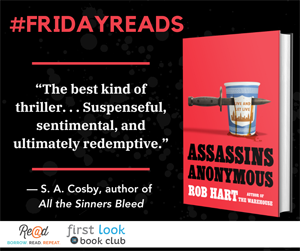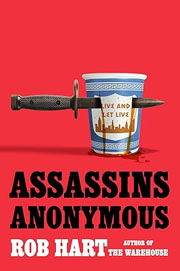
| Mon
Tue
Wed
Thu
Fri
Book Info
Subscribe
| |||
Dear Reader, The other day I observed someone making a choice that would impact their life in a negative way and it irritated me immensely. I couldn't understand why they would make such a bad decision when the right one seemed so clear to me. Later on though, I thought about my own life and realized that I used to walk around with loose wires in my brain. And frankly, it took longer than I like to admit for me to recognize some of my own poor decisions. I guess we all have those loose wires inside of us at some point in our lives. The times when, for some unknown reason, we just can't get-it-together. We see other people participating in this "life thing" with more ease than us and we wonder, "What's wrong with me? Why can't I get plugged in, too?" Thankfully for most of us, those loose wires connect at some point and we take off with a new sense of the realities and possibilities of life. And we find the best part is now clearly within our reach because we've discovered the missing connection. Thanks for reading with me. It's so good to read with friends. Suzanne Beecher P. S. This week we're giving away 10 copies of the book Assassins Anonymous by Rob Hart. Click here to enter for your chance to win.
| |||
|
(continued from Thursday) "Whatever," Booker mutters, folding his arms. I look at Valencia. The one I've had the hardest time figuring out, because she tends to speak the least. Booker is a Marine turned mercenary; Kenji was a Yakuza hitter. Stuart is Stuart. All I can tell about Valencia is she's Mexican, but she doesn't carry herself like military or police, so I figure she had something to do with the cartels. "V, what do you think?" I ask. "I think this is a little too much crosstalk," she says, staring past the circle and through the wall. "Back to the meeting." I wink at Stuart. "What have you got for us, Stu?" "Well," he says, still looking at the ground, now hugging himself for support. "Last night, I went to this bar near my apartment, because I like their fries. Their burgers are sort of meh, but their fries are good. So I got a plate of fries, and the bartender, she was my type." His lips curl into a smirk, and I think all of us freeze a little at the word 'type'. The more Stuart talks, the faster his voice gets: "It's Astoria, so it's generally a quiet neighborhood after last call. I could have followed her home, found out where she lived. Or I could have talked to her and learned a little about her. I was always good at that. Getting people to open up to me. But I didn't. I finished my fries and I paid my bill and I went home." Kenji claps, enthusiastically, and the rest of us follow with a little less verve. "Good for you, Stuart," he says. "How did that feel?" Stuart tilts his head, digging the thumb of his left hand into the palm of his right. "I still wonder what her head would look like sitting in my fridge with an apple crammed in her mouth, but the important thing is, it's still on her shoulders, right?" I can feel the discomfort snaking through the room, so I clap again. No one follows, but it doesn't matter. The silence is broken. "One day at a time, buddy," I tell him. "One day at a time." Booker mutters something, but I can't make it out. Kenji sighs and says, "Thank you, Stuart. Now, our next meeting is going to be a special one . . ." A flush of warmth spreads through my body. Doesn't matter how far we make it in life, we're all just little kids who want a gold star from their teacher. "Mark is a few days out from one year," Kenji says. At this, everyone claps, much more enthusiastically than they did for Stuart. Kenji has seniority here: five years and change. Valencia has four, and Booker is over three. Stuart, the new addition to the group, is still a few months in, which is a delicate time for people in recovery, and why I want to encourage him. Everyone waits, offering me the space to speak. "I almost can't believe it." I take my last prize—my sixmonth chip—out of my pocket. The inscription is barely legible, the hard plastic surface worn smooth from how often I need to rub it between my fingers and remind myself it's real. "I was thinking about it today, how that feeling never goes away. The muscle memory. And it made me think, can I really change? But I guess it doesn't matter whether I can or not, the only important thing is that I want to." I look up and meet everyone's eyes in turn. "I just want to say, I'm thankful for all of you. No one understands what taking a life does. How it screws you up, but then how even more screwed up it is that you get used to it, and then it just becomes a job. Then you go see a movie and it's like this noble profession, but the reality is we're just tools, so somebody with power can have even more power. I can say, with complete and total honesty, even though I still struggle with my programming, I don't miss killing. And that feels good. From the bottom of my heart, I'm thankful for you scumbags." That draws a big, explosive laugh from Booker and a judgmental look from Kenji. Before he can say anything I put my hand up. "I don't say scumbags because you're former killers. I say it because you always leave me alone to clean up after the meetings." "Okay," Kenji says, with just the slightest roll of his eyes. "We've got some time left. Booker, would you like to share?" They do, and the story remains mostly the same. Booker talks about the ghosts of past victims, the ones who follow him through the grocery store and stand by the foot of his bed at night. Valencia talks about wanting to be a mom, but not wanting to be a mom who kills people, and how one day she hopes to be worthy of the privilege. Kenji talks about the amends he made the other night, to the girlfriend of a man he killed in Kyoto. There are no time limits. With only five of us, it can sometimes be hard to fill an hour. All it takes is for someone to be in a mood. But even on the nights we end up telling the same stories, I find comfort in being here. In seeing these people and knowing I'm not alone. As I listen to them I consider the upcoming milestone. One year since the biggest mistake I ever made, if you're not counting all the others. Contentment courses through me, and at the end of the hour, when it's time to say the serenity prayer, I fold my hands together and speak in unison with the group, and it's like I'm saying it for the first time: "Grant me the serenity to accept the things I cannot change, the courage to change the things I can, and the wisdom to know the difference." With the room cleared, I close my eyes and take a deep breath. I like to bust on everyone for leaving me to clean, but really I enjoy it. It's meditative, allowing me space to process the events of the meeting. A nice little decompress before I head back into the world, where the lights and the sounds and the people put me back on edge. For a few moments I feel safe. There's a shuffle behind me. I turn to find Stuart, standing awkwardly on the other end of the room. His hands are clasped in front of him and the way he's looking at me, eyes unblinking, makes me think of a bug, like I turned on the light and caught him and he could bolt in any direction. Maybe I'm just uneasy because I know what he used to get up to in his free time. The silence between us stretches for a beat too long, so I ask, "How you doing there, bud?" "What is the difference between hit men and assassins?" he asks. "A hitman gets paid by a political or criminal organization to kill someone. An assassin kills for religious or political purposes, but they don't always get paid. The lines are blurry. Lee Harvey Oswald was an assassin, but there are guys and gals in this fellowship who changed the course of world events and you'd never know, and they got paid very well to do it. The terms are sort of interchangeable but sort of not. Kind of like how all bourbons are whiskeys, but not all whiskeys are bourbons?" Stuart shakes his head. "I don't get it." "Yeah, I pushed that one too far. It's the best I got at the moment, though." "What does that make me, then?" he asks. "A killer, same as me," I tell him. "Someone who belongs here, same as me." Stuart takes a few steps forward, and I tense, and I think he sees it because he stops. One thing I've learned about him, and a thing I actually give him credit for, is that he's aware of the effect he has on people. "I wanted to say I'm sorry for interrupting Kenji's announcement," he says. "And thank you, for the thing with Booker." "Booker sleeps in a bed made of sandpaper. At the end of the day he's not a bad guy. None of us are. We just have the luxury of recognizing that we've made mistakes." "I like that," Stuart says, chewing on it. "The luxury." "Don't give me too much credit. Kenji said it to me once." Stuart looks down at the floor. "I get it, though. I'm not like the rest of you. Not really." "Hey, Stu." I turn to him fully and wait for him to bring his eyes to mine. "It's good that you're here." "Thank you," he says. "That means a lot, coming from you. Listen . . ." He looks down at the floor again, shuffling his feet, before looking back up at me. "I don't have a sponsor yet. Would you consider . . . doing that?" A clammy wave passes over my skin as it erupts into goose bumps. You don't have to have a sponsor in recovery. Kenji sponsors me, but he doesn't have one. Booker and Valencia sponsor each other. I never considered taking on a sponsee. Up until now I've been happy to defend Stuart—because if he can change, so can I—but taking an active role in his recovery is a different level of commitment. And not one I'm ready for. I'm still trying to handle my own. "I need to think about that," I tell him. He nods, and then, without saying anything else, he steps through the darkened doorway at the far end of the room. With him gone, the air feels a little less thick. A stew of complicated emotions mix in my gut. A little regret, that I might have hurt his feelings. A little relief, that I may have shut the conversation down. Back in the day, I would have done the math, and the equation would be elementary—ending Stuart's life would have the potential to save so many others. Then I would slit his throat and leave him bleeding in a ditch. I'm a different person now. Ultimately I do want him to succeed, but the sponsor/sponsee relationship is an intimate one. I'm going to have to talk to Kenji about this. He might not think I'm ready. One can hope. As I'm about to dump the leftover donuts in the trash can next to the table, there's a squeak of a footstep behind me. "What's up, Stu, forget something?" I ask. As I turn, a boot smashes into my chest. Love this book? Buy a book online.
| |||
| Mon Tue Wed Thu Fri Book Info | |||


